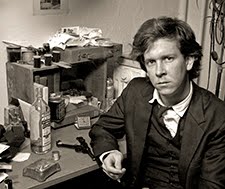*
You may thank frequent contributor and good friend of this blog, Anonymous, for suggesting tonight's visit by Chase, which must be the only prominent group in jazz-rock history to have used four trumpets, and four trumpets only, as its brass section. Listen to this mother!Any geezers out there might remember that the band Chase was eponymously named for its leader, trumpet screamer Bill Chase. Chase (the guy) was old for a rock star, having been born in the middle of the Depression and having gotten his start with the original trumpet monster, Maynard Ferguson (whose lips must have been calloused thick as a catcher's mitt after decades of galloping after F over high C like it was his own fleet-footed strumpet). He then paid dues with Stan Kenton, and especially Woody Herman's New Thundering Herd through the early and mid-1960s. Anyway, my point is that the guy was a veteran jazzman before putting Chase together, so it must have been a blast for him to be, for at least a little while, a bona fide rock star. If you remember "Open Up Wide," then you'll probably also remember Chase's biggest hit, "Get It On." Here's a 1974 live Chicago performance of that tune --- a guerrilla home movie from an album release party about half a year before Bill and three other band members died in a plane crash. Check out the flowing shirts and --- gasp! --- the beards. These are the kind of guys who Buddy Rich mercilessly terrorized on the tour bus week in and week out (refer to the beard confrontation at about 6:00). No wonder younger jazzmen like Chase and Don Ellis tried to become huge rock stars instead! They shoulda stuck with it.
I seem to remember that the other three beardy trumpeters in Chase were also alums of the New Thundering Herd. All of them are adept at playing in this piercing brass register, and this particular chart really makes the most of those tones with insanely rich chromaticism and dissonances. Nobody I'm aware of ever used trumpets like this except Bill Chase --- at least not without another 15 pieces playing along. Nice use of the Echoplex at the beginning. Other than that, nothing to say except just listen to these staccato motherfuckers! And don't miss the rhythm section!
I owned the first two Chase albums back when I was a scrawny suburban delinquent, but I remember being somewhat bored by most tracks on those discs. I think the problem was that Chase and the boys tried getting a little too arty-farty (i.e., heavy) but couldn't quite pull it off in a way that the kids related to. They're probably worthy of revisiting in their entirety, however, just in case.
I read in the YouTube comments section that marching bands attempt to perform "Open Up Wide." I've never heard one try it. Sounds like a foolhardy task to say the least, if not less. A world-class bugle corps... maybe.
Open Up Wide, Chase (1971, from "Chase," Epic Records), via YouTube.



